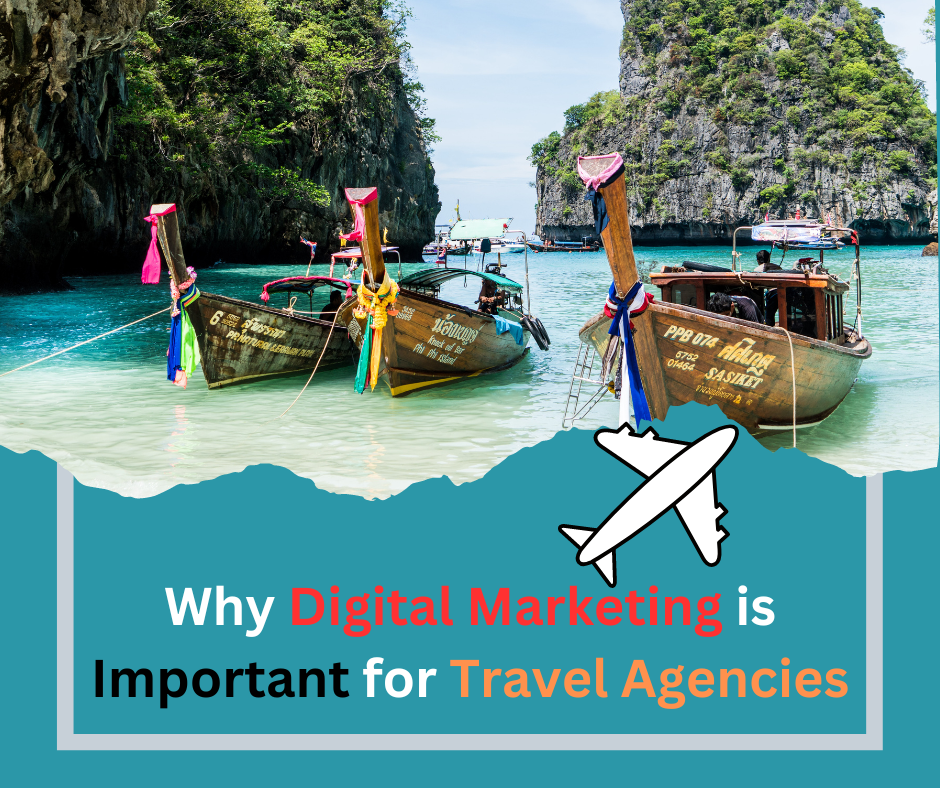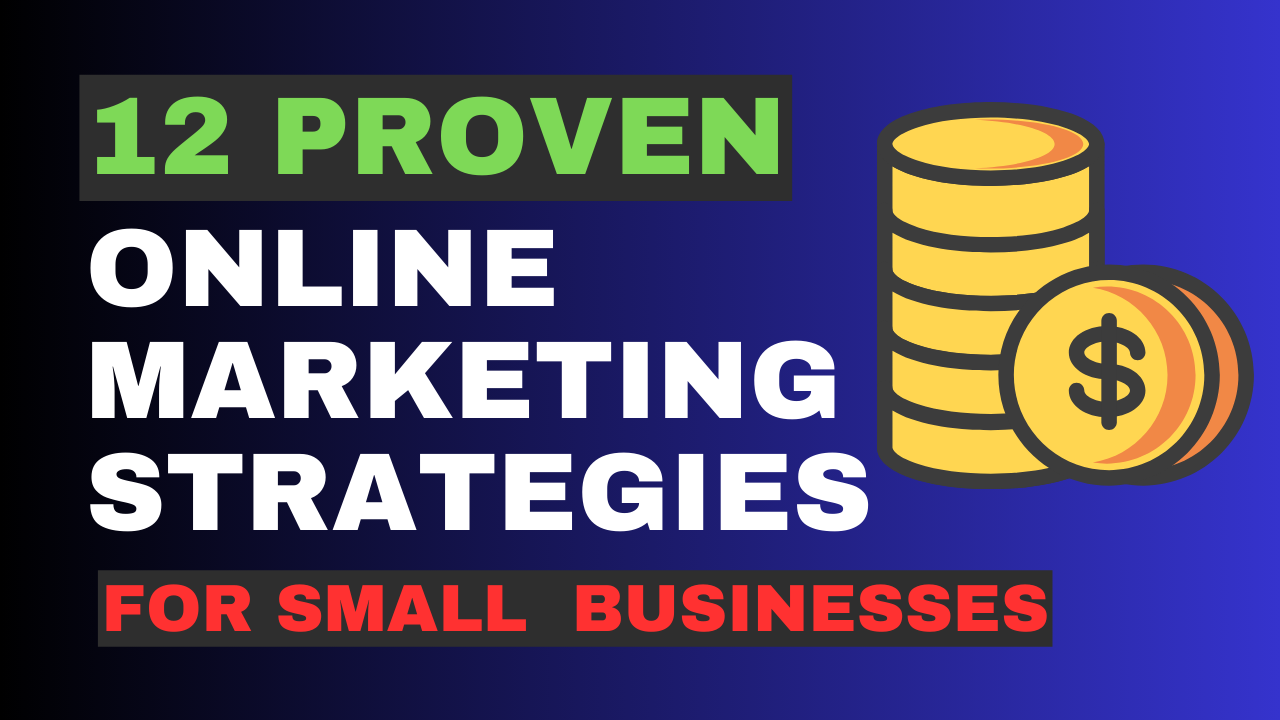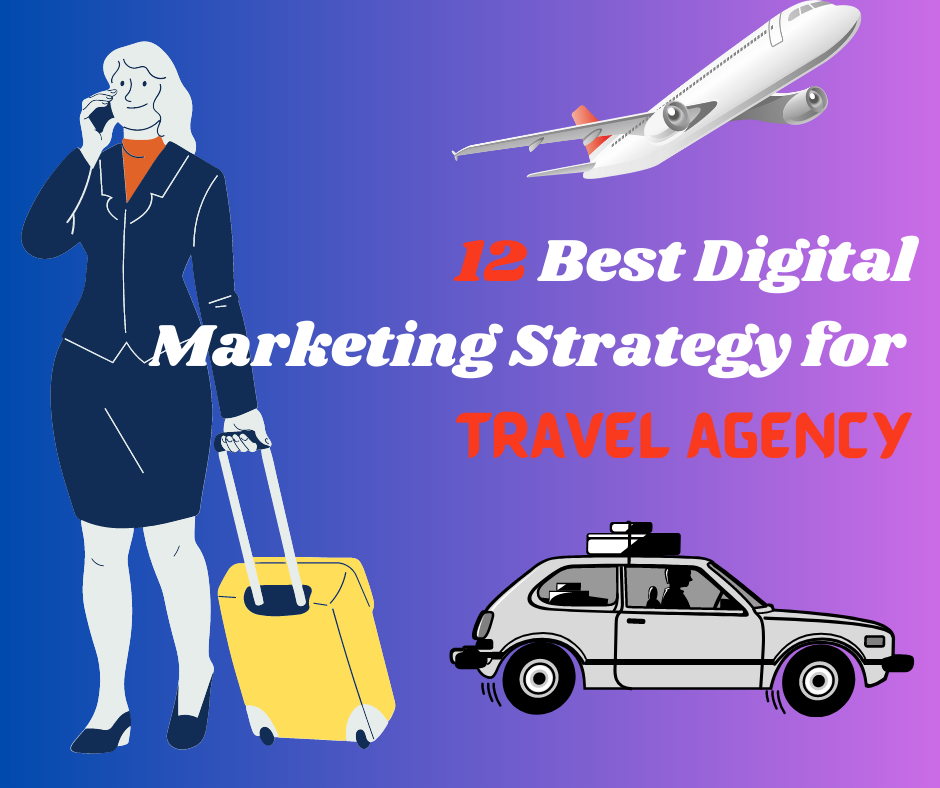In today’s digital age, the world has become more interconnected than ever before. As a result, businesses, including travel agencies, need to adapt and embrace digital marketing strategies to stay relevant and competitive.
Digital marketing refers to the use of online channels and platforms to promote products and services and engage with potential customers. For travel agencies, leveraging digital marketing techniques is vital to thriving in the highly competitive tourism industry.
The Role of the Internet in the Travel Industry
The advent of the internet has significantly transformed the way people plan and book their travel experiences.
Travel agencies now have the opportunity to reach a broader audience and cater to the evolving needs of travelers.
The internet has enabled travel agencies to have a global presence, making it easier for potential customers to find and connect with them.
Why Digital Marketing is Important for Travel agencies?
Digital marketing is important for travel agencies because it allows them to reach a wider audience, target their marketing more effectively, and track their results more accurately.
In today’s digital age, more and more people are planning their vacations online. In fact, according to a study by Phocuswright, 83% of travelers book their vacations online.

This means that if a travel agency wants to be successful, they need to have a strong digital marketing presence.
Here are some of the benefits of digital marketing for travel agencies:
- Reach a wider audience: Digital marketing allows travel agencies to reach a wider audience than traditional marketing methods, such as print ads or TV commercials. This is because digital marketing can be targeted to specific demographics, interests, and even locations.
- Target your marketing more effectively: Digital marketing also allows travel agencies to target their marketing more effectively. This is because they can track the behavior of their website visitors and use this information to create more relevant and engaging marketing messages.
- Track your results more accurately: Digital marketing also allows travel agencies to track their results more accurately. This is because they can track the number of website visitors, leads, and bookings that they generate from their marketing campaigns.
Some of the most effective digital marketing strategies for travel agencies include:
- Search engine optimization (SEO): SEO helps travel agencies rank higher in search engine results pages (SERPs). This means that when people search for travel-related terms, their website will be more likely to appear in the results.
- Pay-per-click (PPC) advertising: PPC advertising allows travel agencies to place ads on search engines and other websites. When someone clicks on an ad, the travel agency pays a set fee.
- Social media marketing: Social media marketing allows travel agencies to connect with potential customers on platforms like Facebook, Twitter, and Instagram. They can share photos, videos, and blog posts about their destinations and services.
- Content marketing: Content marketing involves creating and sharing valuable content that attracts and engages potential customers. This content can include blog posts, infographics, e-books, and videos.
By using these and other digital marketing strategies, travel agencies can reach a wider audience, target their marketing more effectively, and track their results more accurately. This can help them to grow their business and attract more customers.
Advantages of Digital Marketing for Travel Agencies
- Targeted Marketing: One of the key advantages of digital marketing is the ability to target specific audiences. Travel agencies can use various tools and data analytics to identify potential customers and tailor their marketing efforts accordingly. This targeted approach ensures that marketing resources are utilized efficiently, leading to higher conversion rates.
- Cost-Effectiveness: Compared to traditional advertising methods, digital marketing offers a cost-effective solution for travel agencies. Online campaigns can be tailored to suit different budgets, and platforms like social media and email marketing allow agencies to reach a vast audience without breaking the bank.
- Improved Customer Engagement: Digital marketing enables travel agencies to engage with customers in real-time. Through social media platforms, agencies can respond to queries, provide travel tips, and create a sense of community. Engaging with customers on a personal level builds trust and loyalty, encouraging repeat business and referrals.
1. Search Engine Optimization (SEO) for Travel Agencies
- Keyword Research: Proper keyword research is crucial for travel agencies to appear in relevant search results. By understanding the common search terms used by travelers, agencies can optimize their website content and rank higher on search engine results pages (SERPs).
- Content Marketing: Creating valuable and informative content is an effective way to attract potential customers. Travel agencies can publish blogs, destination guides, and travel tips to establish themselves as authorities in the industry and attract organic traffic.
- Local SEO for Targeted Reach: For travel agencies operating in specific locations, local SEO is essential. Optimizing for local searches ensures that the agency appears in location-based queries, increasing the chances of attracting customers looking for travel services in that area.
2. Social Media Marketing in the Travel Industry
- Building Brand Awareness: Social media platforms offer an excellent opportunity for travel agencies to showcase their services and create brand awareness. Engaging posts, stunning visuals, and compelling stories can capture the attention of potential travelers.
- Connecting with Potential Customers: Social media facilitates direct communication with potential customers. Travel agencies can use platforms like Facebook, Instagram, and Twitter to address inquiries, share travel experiences, and create a sense of community around their brand.
- Utilizing Influencer Marketing: Partnering with travel influencers can amplify a travel agency’s reach and credibility. Influencers can promote travel packages, destinations, and experiences, influencing their followers’ travel decisions.
3. Pay-Per-Click (PPC) Advertising for Travel Agencies
- Google Ads and Bing Ads: PPC advertising allows travel agencies to bid on keywords and display their ads at the top of search engine results. This form of advertising ensures visibility to users actively searching for travel-related services.
- Display Advertising for Increased Visibility: Display ads, such as banners and pop-ups, can be strategically placed on relevant websites to target potential travelers. Display advertising enhances brand visibility and can attract users who might not be actively searching for travel services.
4. Content Marketing Strategies for Travel Agencies
- Engaging Blogs and Articles: Creating engaging and informative blog posts and articles helps travel agencies connect with their audience. Travel guides, destination highlights, and insider tips can entice potential travelers to explore the agency’s offerings.
- Visual Content: Videos and Infographics: Visual content, such as videos and infographics, is highly shareable and can go viral. Travel agencies can create visually appealing content that showcases the beauty of destinations and the unique experiences they offer.
5. Email Marketing for Travel Agencies
- Personalized Offers and Deals: Email marketing allows travel agencies to send personalized offers and exclusive deals to their subscribers. This targeted approach can entice previous customers to book again and attract new ones.
- Building Customer Loyalty: Staying in touch with customers through email campaigns helps build loyalty. Sending post-trip follow-ups, requesting reviews, and offering loyalty rewards can encourage repeat business.
6. Mobile Marketing and Its Significance
- Mobile-Friendly Websites: As more travelers use mobile devices to plan their trips, having a mobile-friendly website is crucial. A responsive website ensures a seamless user experience across various devices.
- Location-Based Marketing: Location-based marketing utilizes a user’s location to deliver targeted offers and promotions. Travel agencies can use this strategy to entice travelers who are already in or near their destinations.
7. Online Reviews and Reputation Management
- Encouraging Positive Reviews: Positive reviews and testimonials can significantly impact a travel agency’s reputation. Providing excellent service and encouraging customers to leave positive feedback can enhance the agency’s online presence.
- Addressing Negative Feedback: Handling negative reviews with professionalism and addressing customer concerns shows that the agency values its clients. Responding to negative feedback positively can turn dissatisfied customers into loyal advocates.
Importance of Analytics and Data for Travel Agencies
- Measuring Campaign Effectiveness: Digital marketing provides travel agencies with valuable data and analytics to assess the performance of their marketing campaigns. By tracking key metrics such as website traffic, conversion rates, and click-through rates, agencies can evaluate the effectiveness of their strategies. This data-driven approach allows them to make data-backed decisions and optimize their campaigns for better results.
- Making Informed Decisions: Analyzing data helps travel agencies understand customer behavior and preferences. By identifying trends and patterns, agencies can tailor their marketing efforts to meet the specific needs of their target audience. Informed decision-making based on data insights can lead to better customer satisfaction and increased business growth.
Embracing Innovation and Technology
The digital landscape is ever-evolving, and travel agencies must stay updated with the latest technological advancements. Embracing innovative solutions can give agencies a competitive edge and enhance the overall customer experience.
- Virtual Reality (VR) in Travel Marketing: Virtual reality technology allows travelers to experience destinations virtually before making their bookings. Travel agencies can leverage VR to showcase breathtaking locations, hotels, and activities, providing potential customers with a taste of their upcoming journey.
- Chatbots for Improved Customer Support: Chatbots are AI-powered assistants that can handle customer inquiries and provide real-time support. By integrating chatbots into their websites and social media platforms, travel agencies can offer round-the-clock customer service and address common queries instantly.
Overcoming Challenges in Digital Marketing for Travel Agencies
- Competition in the Online Space: The digital realm is fiercely competitive, with numerous travel agencies vying for the attention of potential customers. To stand out, agencies must focus on creating unique and compelling content, building a strong brand identity, and offering exceptional customer service.
- Keeping Up with Evolving Trends: Digital marketing trends are constantly changing, and travel agencies must adapt to these shifts to stay relevant. Continuous learning and staying updated with the latest industry trends are essential to ensure that agencies remain competitive and ahead of the curve.
Case Studies of Successful Digital Marketing Campaigns of Travel Agencies
Here are some case studies of successful digital marketing campaigns of travel agencies:
- Tour My India: Tour My India is a travel agency based in India. They partnered with TIS India to launch a digital marketing campaign that resulted in a 1,407% increase in conversions. The campaign used a variety of channels, including SEO, PPC, social media, and content marketing.
- Kenya Tourism Board: The Kenya Tourism Board partnered with Expedia to promote Kenya as an incredible destination to travelers. They chose a famous travel blogging couple and sent them on a one-week trip to Kenya with no fixed itinerary. The people following this couple on Instagram could decide the itinerary by voting through an Instagram Stories poll. Throughout the week, the couple broadcasted their journey to their Instagram followers. The content was also repurposed on a microsite. This campaign was a huge success.
- Graubünden Tourism: Graubünden Tourism is a tourism board in Switzerland. They launched a campaign called “Yodel Ay Hee Hoo” which used a live video stream from a mountain village into a train station. This encouraged passers-by to engage in conversation with a man from the village. It was a fun and quirky campaign that used modern technology to engage and surprise audiences.
- British Airways: British Airways launched a campaign called “#Lookup” which used billboards with QR codes. When people scanned the QR codes, they were taken to a website where they could see a video of a plane flying overhead. This campaign was a great way to get people’s attention and generate interest in British Airways.
Statistics of Successful Digital Marketing Campaigns of Travel Agencies
here are some statistics of successful digital marketing campaigns of travel agencies:
- 83% of travelers book their vacations online. This means that if a travel agency wants to be successful, they need to have a strong digital marketing presence.
- The average person spends 14 hours per week on social media. This makes social media a great platform for travel agencies to reach potential customers.
- 64% of people trust online reviews as much as they trust personal recommendations. This means that travel agencies should make sure to have a strong online presence and positive reviews.
- 72% of people are more likely to book a vacation with a travel agency that has a mobile-friendly website. This means that travel agencies need to make sure their website is optimized for mobile devices.
- The average cost of a paid search click is $2.32. This means that travel agencies need to make sure their paid search campaigns are targeted effectively.
Here are some examples of successful digital marketing campaigns for travel agencies:
- Inspired by Iceland: This campaign by the Icelandic government and tourism industry used humor and stunning visuals to promote Iceland as a travel destination. The campaign was a huge success, generating over 1 billion media impressions and driving a significant increase in tourism to Iceland.
- Booking.com’s “Book the Unknown” campaign: This campaign by Booking.com encouraged people to book trips to destinations they knew nothing about. The campaign was a hit with consumers, and it helped Booking.com to increase its brand awareness and sales.
- Virgin Holidays’ “The Holiday Heist” campaign: This campaign by Virgin Holidays used a creative video to promote its winter holiday deals. The video went viral, and it helped Virgin Holidays to sell out of its winter holidays.
These are just a few examples of successful digital marketing campaigns for travel agencies. By using the right strategies and tactics, travel agencies can reach a wider audience, target their marketing more effectively, and track their results more accurately. This can help them to grow their business and attract more customers.
Boost your online presence and reach your target audience effectively with Mercatodigi – Your one-stop solution for top-notch digital marketing services. Maximize your business growth through our expert strategies and tailored campaigns. Visit us now to embark on a successful digital marketing journey!
Conclusion
In conclusion, digital marketing plays a pivotal role in the success of travel agencies in today’s highly interconnected world. With the growing reliance on the internet for travel planning, it is crucial for agencies to embrace digital marketing strategies to reach and engage with their target audience effectively.
By leveraging targeted marketing, SEO techniques, social media platforms, and other digital marketing tools, travel agencies can enhance their online visibility, attract potential customers, and build lasting relationships with their clientele. Embracing innovation, analyzing data, and overcoming challenges will further propel travel agencies towards achieving their business objectives.
Digital marketing offers an opportunity for travel agencies to thrive in the competitive tourism industry and remain at the forefront of travelers’ minds. The ability to adapt to evolving trends and incorporate technology-driven solutions will undoubtedly lead to continued growth and success for travel agencies worldwide.
FAQs
Is digital marketing only for large travel agencies?
No, digital marketing is equally important for both large and small travel agencies.
It allows smaller agencies to reach a broader audience and compete on a level playing field with bigger players.
How can social media help in promoting a travel agency’s services?
Social media platforms offer a space for travel agencies to showcase their services, engage with potential customers, and build brand loyalty.
Visual content and influencer marketing on social media can significantly impact brand awareness and customer engagement.
What is the significance of online reviews for travel agencies?
Online reviews serve as testimonials from previous customers, influencing potential travelers’ decision-making process.
Positive reviews can enhance a travel agency’s reputation and attract more customers.
How can a travel agency measure the success of its digital marketing campaigns?
Travel agencies can measure the success of their digital marketing campaigns through various metrics, such as website traffic, conversion rates, click-through rates, and customer feedback.
Analyzing data and key performance indicators (KPIs) helps agencies assess their strategies’ effectiveness.
Should travel agencies invest in virtual reality technology?
Investing in virtual reality technology can be beneficial for travel agencies looking to provide an immersive experience to potential customers.
VR allows travelers to virtually explore destinations, accommodations, and activities, enhancing their engagement and decision-making process.





